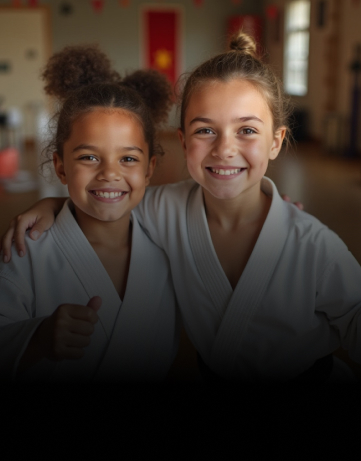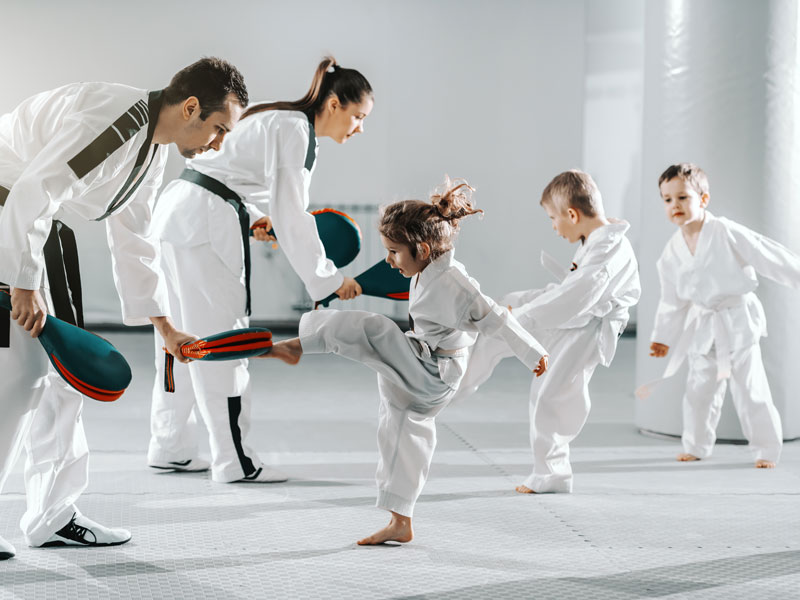How Martial Arts for Kids Can Increase Self-confidence and Discipline in Youthful Martial Artists
Karate for kids supplies an one-of-a-kind chance to build self-confidence and discipline in young martial musicians. As they learn brand-new techniques and face obstacles, they not only obtain skills but likewise develop a strong feeling of self-worth. This organized setting encourages them to value the journey of renovation. How does this training convert into their everyday lives? Discover the much deeper connections that make karate more than simply a sport.
The Significance of Confidence in Childhood Years Growth
Self-confidence is a necessary foundation in childhood years development. When you nurture your youngster's self-confidence, you encourage them to deal with obstacles, take risks, and reveal themselves freely. Children with self-confidence are more going to discover social scenarios and brand-new activities, which can result in long-term relationships and valuable experiences.Encouraging your child to get out of their convenience area cultivates strength. They learn that failure isn't completion yet instead a tipping rock to success. By celebrating their accomplishments, no issue just how tiny, you help them acknowledge their capabilities and worth.In this trip, assistance and favorable support from you play a crucial duty. Whether it's via praise or simply being present, your participation increases their self-confidence. As they grow, this self-assurance comes to be a long-lasting asset, furnishing them to navigate both obstacles and opportunities with a solid sense of self.
How Martial Arts Shows Self-control and Focus
Karate helps you construct technique and emphasis through its structured training routine. As you exercise mindfulness during each session, you'll learn to focus much better both on and off the mat. And also, establishing and accomplishing goals in martial arts enhances your capability to stay attentive and committed.
Structured Training Regimen
While you involve in karate training, you'll swiftly discover how an organized program instills self-control and emphasis in young professionals. Each class follows a specific style, including workouts, method practice, and sparring. This uniformity shows you to appreciate the process and devote to improvement. As you find out methods and forms, you develop a feeling of obligation for your own progress.The organized environment urges you to set goals, whether understanding a new belt or improving a kata. You'll find that staying concentrated throughout classes and drills develops your concentration. The self-control you grow in karate prolongs past the dojo, favorably impacting your schoolwork and everyday regimens. Each session enhances the importance of commitment, aiding you become a much more self-displined person.
Mindfulness in Practice
As you practice karate, you'll discover that mindfulness comes to be a necessary component of your training. Each move requires your full interest, assisting you remain concentrated on the existing moment. You'll learn to ignore diversions and focus on your breathing, activities, and purposes. This enhanced recognition develops your reflexes and boosts your discipline.During sparring or kinds, you'll uncover the relevance of being emotionally existing - Karate Salisbury MD. You'll see just how this emphasis not just enhances your method but also builds your confidence. By practicing mindfulness in martial arts, you grow persistence and durability, necessary attributes that prolong beyond the dojo. By doing this, karate teaches you to harness your mind, aiding you create a regimented technique to difficulties both on and off the mat

Personal Goal Setting Techniques
Setting objectives in karate isn't almost earning belts; it's a powerful method to grow discipline and focus. When you set certain, achievable targets, you create a roadmap for your development. As an example, rather than simply aiming to enhance your kicks, attempt concentrating on understanding a particular method monthly. This strategy maintains you motivated and engaged.Breaking down larger goals into smaller, manageable steps helps you track your progress and celebrate small victories in the process. Whether it's refining your stance or enhancing your sparring endurance, every goal reinforces your commitment. As you achieve these objectives, you'll construct self-confidence in your abilities and establish a strong sense of discipline that extends past the dojo right into daily life.
Building Durability Through Martial Arts
Martial arts, particularly martial arts, uses youngsters a special chance to build resilience in a supportive setting. In courses, they deal with difficulties that push their restrictions, whether it's understanding a brand-new method or sparring with a companion. Each problem, like a missed kick or a shed match, comes to be an opportunity to discover and grow.As they exercise, youngsters learn read review to welcome discomfort and maintain trying, even when points get challenging. They find that failure isn't completion; it belongs to the journey. This state of mind helps them jump back stronger, not simply in the dojo, but in day-to-day life.With each difficulty they conquer, your youngster develops self-confidence in their capability to tackle obstacles, fueling their determination. Via karate, they'll understand that strength isn't nearly physical toughness; it has to do with psychological grit and willpower, equipping them to encounter whatever life throws their way.
The Function of Respect in Martial Arts Training
Regard is a foundational concept in karate training, fostering a culture of discipline and sociability among pupils. When you step onto the dojo flooring, you're not just finding out techniques; you're likewise finding out to respect your instructors, peers, and the art itself (Karate Salisbury MD). Bowing at the beginning and end of class isn't just a rule; it represents your recommendation of others' initiatives and dedication.As you develop mutual respect, you'll discover it improves your learning experience. You'll listen much more attentively to your trainer and gain insights from fellow trainees. This atmosphere urges positive objection and assistance, permitting every person to expand together.Moreover, regard grows self-control. Identifying the worth of tough job and humbleness aids you remain concentrated on your training. Subsequently, this regard converts right into your day-to-day life, boosting your communications and connections outside the dojo. With karate, you learn that respect is important for personal growth and area structure
Setting Goals and Achieving Success in Karate

Social Abilities and Synergy in the Dojo
While training in the dojo, children normally create crucial social abilities and synergy capacities. As they exercise along with peers, they find out to connect properly, share room, and assistance one an additional. Each class provides opportunities for cooperation, whether it's throughout companion drills or group exercises. This teamwork fosters relationships and develops a feeling of belonging, making the dojo a nurturing environment.Kids likewise acquire important conflict resolution abilities. When they run into obstacles, such as arguments throughout sparring, they learn to navigate these scenarios constructively. They practice patience and compassion, recognizing that everybody has different toughness and weaknesses.Moreover, joining group tasks grows a sense of responsibility. You'll see your child finding out to depend on teammates and take duty for their function in a group. These experiences not just enhance their fighting styles journey but additionally equip them with social devices they'll bring right into other locations of life.

The Long-Term Benefits of Karate Beyond Childhood
As youngsters mature and change right into the adult years, the benefits of martial arts expand much past the dojo. You'll locate that the discipline and focus learned through karate can translate into your academic and professional life. Establishing and attaining objectives in fighting styles cultivates a solid job principles, which can push you to master any type of endeavor.Moreover, the confidence acquired from mastering techniques and competing can improve your self-confidence, helping you tackle obstacles head-on. This strength comes to be very useful as you encounter the unpredictabilities of adulthood.Additionally, the social skills developed via team effort and friendship in the dojo can result in better partnerships in both expert and personal rounds. You'll discover to communicate effectively, willpower disputes, and build an encouraging network.Ultimately, karate shapes not just skilled martial musicians, but well-rounded people ready to tackle the world.
Regularly Asked Concerns
What Age Is Ideal to Begin Martial Arts for Children?
You can begin karate as early as age 4 or 5, however it frequently relies on your youngster's maturity and passion. Discovering a course that suits their age and power level makes a huge distinction.
Are There Any Kind Of Health Conveniences From Practicing Karate?
Yes, exercising karate offers countless health advantages. You'll boost your adaptability, strength, and sychronisation while increasing cardio fitness. Plus, it improves emphasis and mental wellness, making it a superb choice for overall physical and psychological wellness.
How Frequently Should Youngsters Go To Martial Arts Courses?
You ought to encourage your youngsters to go to karate courses at the very least 2 to 3 times a week. Uniformity aids them learn techniques efficiently and establish skills, making their experience much more delightful and rewarding in the future.
Can Karate Aid With Managing Anxiety in Kid?
Yes, martial arts can aid take care of anxiety in youngsters. It educates emphasis and self-constraint while supplying a risk-free outlet for energy. You'll notice your youngster expanding a lot more positive and calm as they exercise on a regular basis.
What Gear Is Needed for Children Beginning Martial Arts?

Comments on “Best Karate for kids – Highly Rated Programs Focused on Self-Control and Resilience”